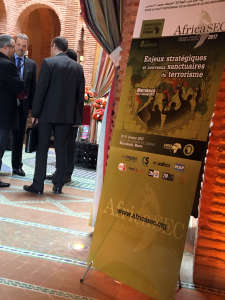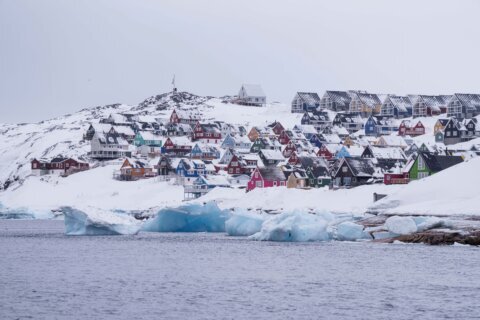MARRAKECH, Morocco — In the midst of a worsening global terrorism epidemic, dozens of government, military, intelligence, nongovernmental officials and experts gathered in Morocco to discuss how to stop terrorist expansion in Africa that may spill over to other continents.

One by one, representatives from Africa, Europe and the Middle East stepped up to the podium at the Marrakech Security Forum and expressed key anxieties, which included evolving terrorist recruiting tactics, new terrorist sanctuaries and limited resources to fight extremists who are finding new life in Africa’s many ungoverned spaces.
As Africa’s leaders grapple with counter terrorism strategies, a crucial concern bubbling up across the continent and in numerous whispered conversations at the conference was whether the U.S. is turning away from Africa at this critical time.
American influence in Africa, according to some at the conference, is waning because of the perception that the U.S. is more concerned with its own internal issues and political chaos.
“The U.S. should be careful not to relinquish its standing in Africa because other nations will step into the vacuum, further reducing U.S. influence,” said an African diplomat who asked not to be identified.
But in a stunning, but not entirely unusual, development in front of nearly 200 representatives, a Russian academic boldly blamed the U.S. military for the deteriorating security climate in parts of Africa because of American military and drone activity.
In a blistering 10-minute speech, Sergey Kostalyanets, a senior research fellow on African Studies at the Russian Academy of Sciences, took direct aim at the U.S. Africa Command, saying it undermines Africa’s ability to find its own solutions to terrorism.
“From my point of view, the proliferation of (U.S.) military bases and the expansion of military presence on the continent is detrimental to the war on terrorism,” Kostelyanets told WTOP in an interview.
Kostelyanets specifically derided the U.S. Africa Command. “Some cooperation with African countries is necessary, but the actual permanent bases and independent operations of foreign militaries in Africa is bad,” Kostelyanets said.
He also pointed out “that there was opposition on the part of African leaders” to U.S. Africa Command setting up its headquarters on the continent and suggested that it had been ineffective. He said U.S. Africa Command, which is based in Stuttgart, Germany, “follows its own agenda and engages in extraterritorial operations involving U.S. troops, sometimes without the knowledge of local governments.”
His comments caught some off guard in the audience. A prominent U.S. academic in the audience appeared irritated.
Dr. David Pollock, the Kaufman fellow at The Washington Institute, chastised Kostelyanets for omitting Russian activities in foreign countries while pointing at the U.S.
“U.S. help fighting terrorism is actually welcomed by almost every African government,” Pollock told WTOP.
He further pushed back against Kostelyanets’ accusations. “The most senior Russian officials and experts say they want to cooperate with the U.S.in fighting terrorism — which hardly suggests that American intervention could be making things worse,” Pollock said.
A U.S. Africa Command representative slated to speak at the event an hour before Kostelyanets made his controversial remarks did not appear. WTOP asked U.S. Africa Command for a response to Kostelyanets’ accusations and why its representative was not in attendance, but did not receive a response in time for publication.
The public dispute was short-lived and soon the usual decorum returned to the event.
The forum, in its eighth year, focused on “Strategic issues and new terrorism sanctuaries.”
Professor Mohammed Benhammou is the architect of the conference, which is widely viewed as one of the most successful of its kind.
“Africa is a dynamic place,” Benhammou said. “However, this virtuous dynamism is accompanied by increased security threats and the emergence of new ones that endanger the continent’s stability and growth.”
Benhammou reminded the military officials, politicians and experts in attendance that “It’s important to act together on the threats because they are of a global nature and need a global response.”
Not only were terrorism and violent extremism central agenda items, but climate change, conflict zones and border control inside Africa were equally explored in the context of risk factors for threats to international security.
Dr. Zakaria Ousman, chairman of the Chadian Center for Strategic Studies and Perspective analysis, said climate change can impact violent extremism.
“Eighty percent of the people in West Africa, the Sahel and the Horn of Africa live off farming, raising livestock and fishing,” Ousman said. “When it rains, people can make a living. When it doesn’t rain, people will be faced with dire circumstances that will impact their ability to survive.”
He said climate change will likely force people to move, possibly cause crowding and leading to conflict. “Vision and good governance will be necessary to fix the problems,” he said. But he added that those solutions will take time to achieve — time that climate change may not allow.








